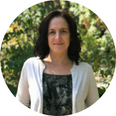Faces of FASEB
Blending Traditions
 Maria Clara Franco, PhD, is Assistant Professor and Director of the Cell Culture Facility in the Department of Biochemistry and Biophysics at Oregon State University. Franco’s research focuses on the study of the role of oxidants and oxidized molecules in neurological diseases.
Maria Clara Franco, PhD, is Assistant Professor and Director of the Cell Culture Facility in the Department of Biochemistry and Biophysics at Oregon State University. Franco’s research focuses on the study of the role of oxidants and oxidized molecules in neurological diseases.
In this interview, Franco shares her educational and professional journeys, defines the Hispanic/LatinX identity as it related to her lived experience, and reflects on challenges still faced by Hispanic/LatinX scientists today.
Let’s start the conversation with learning about you. Can you share your background with our audience?
Franco: I am Hispanic and Latina (we will get to what this means to me later). I graduated with a bachelors/master’s in Molecular and Cell Biology, and later with a Ph.D. in Biological Chemistry from the Universidad de Buenos Aires, Argentina. A year before graduating, I had the opportunity to work as a visiting graduate student in the Burke Neurological Institute/Weill Cornell Medicine in New York in the laboratory of Alvaro G. Estevez, PhD, who would become my postdoctoral mentor. This was a life-changing experience. Estevez has been one of the most influential mentoring figures in my professional life. I am now a well-established assistant professor in the Department of Biochemistry and Biophysics at Oregon State University, and the proud mentor of a very diverse, outstanding, hard-working research group.
How would you define Hispanic and LatinX?
Franco: This is something that had never crossed my mind until I moved to the US, but that I ask myself quite often lately. I am surrounded by different cultures, incorporating different aspects of those cultures into my own in my daily life, and reflecting on the meaning of being Hispanic has opened my mind in many different ways. Technically speaking, I believe being Hispanic relates to language, culture and traditions. But I am also Latina, from Latin America. In myself, I see both aspects weaved together. I relish family and friendship, long hours at the table, eating and talking about anything and everything. I am proud of my heritage, and also proud of our resilience, empathy, and adaptability, which allow me to blend those traditions I cherish with new ones. My daughters were born in Florida and speak fluent Spanglish (Ha!). Ours is a family that embraces old and new traditions in an amazingly rewarding way.
What challenges do you think confront the Hispanic and LatinX communities in the scientific field? How did you overcome these challenges? What is your advice for the next generation?
Franco: As a Hispanic woman in a STEM discipline, I believe that overcoming isolation and participating in professional networking are some of the most common challenges faced by women and minorities in science. Having a support net is crucial. One of my strategies to increase my interaction with colleagues is based on promoting opportunities for informal networking. I also strive to be an active member of the scientific community at every possible level. Navigating through these different experiences also helped me become aware of my own subconscious biases. I realized that I naturally seek connecting with people from a similar background and with similar experiences as mine. As many, I feel more comfortable among people I can easily relate to rather than facing and managing the black box that represents our individual differences. I have worked and keep working on addressing this bias by opening the black box, recognizing and understanding the differences, and looking at them as an opportunity to learn and connect with others rather than letting them keep us apart. My advice to the next generation is to start building a supportive network of mentors and colleagues early on. Believe in yourself and what you can accomplish and reflect on your own bias.
We evolve from our life experiences. If you could go back in time, what advice would you give to your younger self?
Franco: Doubt what you know because you are eager to learn more, not because of the perception others have of you.
Maria Clara Franco is a member of Society for Redox Biology and Medicine, a FASEB member society.